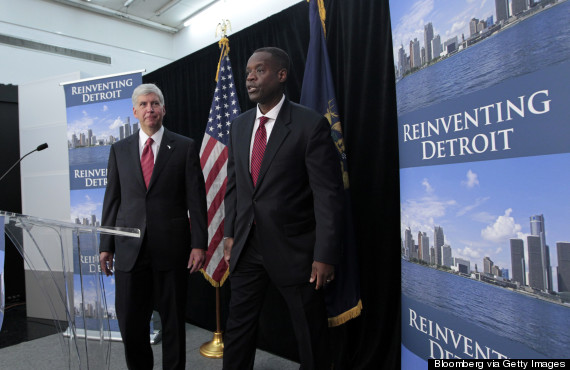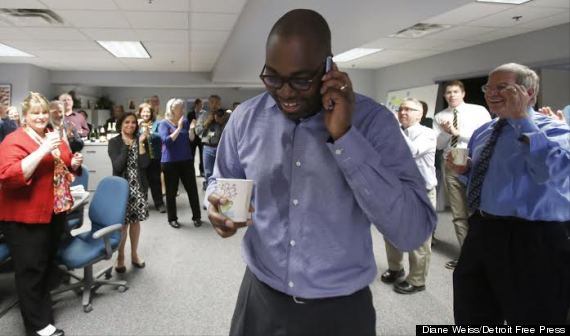This year's Pulitzer Prize for Commentary was awarded to a 43-year-old journalist you've likely never heard of before. Winner Stephen Henderson wowed the committee of judges for his tough writing and bold stances in the Detroit Free Press this year as Detroit plunged into bankruptcy.
His columns were “written with passion and a stirring sense of place, sparing no one in their critique," the Pulitzer committee declared.
Watch Henderson react after finding out he won the Pulitzer Prize on Monday:
Henderson, who was born in Detroit, has been the Free Press' editorial director and editorial page editor since 2008.
"He has the courage to ignore the pressure of politics and the hate sometimes directed at him personally and to remind everyone -- readers and leaders -- where their focus should be," Free Press Editor Paul Anger wrote in Henderson's Pulitzer submission letter.
Here are some reasons why Henderson's 2014 Pulitzer Prize was so well-deserved, accompanied by excerpts of his strongest work.
Henderson's roots in Detroit give his writing context and authenticity. He has a gift for thinking about his past, and connecting it with what's going on in the present.
"We weren’t the typical family in the King Homes, as we called the project when I was a kid. My mother’s meager income qualified us for subsidized housing, but she also made enough to send my sister and me to private schools; she knew education was the way forward for us, so she scrimped on housing...
"Now, it is a place so ravaged by crime that a multi-agency task force is sweeping it for offenders. For months, reports have talked about the prevalence of drug dealing and violence, and of how scared residents are there.
"That’s not progress, nor is it any way to live. This city won’t bounce back until places like the King Homes are safe for less fortunate families, and given the frequency of these raids around town, it’s clear we have a long way to go before that’s true."
He also has a knack for swiftly explaining issues, like municipal bankruptcy, that can be really tough to understand."The metaphor that leaps to my mind is geometric. A right triangle has three sides, all of which depend on the others to form the structure. But its defining elements are the angle formed by the intersection of the two inferior sides, and the superior third side that’s created as a result.
"[Detroit Emergency Manager Kevyn] Orr is assigning the interests of creditors and employees to those inferior sides. Residents and services are the dominant side, whose interests should be nurtured by the intersection of the other two. You borrow money to build infrastructure for residents. You hire employees to provide services — for residents."
Henderson predicted that Detroit would become the largest U.S. city in history to file for bankruptcy, and made sure the shame and blame were shared by all involved.
 Michigan Governor Rick Snyder, left, and Kevyn Orr, emergency manager for the city of Detroit, in July, 2013. Detroit, the cradle of the automobile assembly line and a symbol of industrial might, filed the biggest U.S. municipal bankruptcy after decades of decline left it too poor to pay billions of dollars owed bondholders, retired cops and city workers. (Jeff Kowalsky/Bloomberg via Getty Images)
Michigan Governor Rick Snyder, left, and Kevyn Orr, emergency manager for the city of Detroit, in July, 2013. Detroit, the cradle of the automobile assembly line and a symbol of industrial might, filed the biggest U.S. municipal bankruptcy after decades of decline left it too poor to pay billions of dollars owed bondholders, retired cops and city workers. (Jeff Kowalsky/Bloomberg via Getty Images)
"This is what happens when you systematically disinvest from a region’s core city over half a century, while the suburbs grow and regional leaders cheer the economic and social divide that opens up and swallows the area’s vitality. This is what happens when those left behind in the city borrow 33 times what the whole place is worth, and continue to make promises — to employees and residents — that are the most irresponsible form of economic fantasy.
"And this is what happens when the bill for all that irrationality comes due."
But he didn't just pass around blame. Henderson blasted Detroit's leadership for prioritizing power and self-control over improving EMS, police response times and other services that could save lives.
"At minimum, let's say people in the city shouldn't be dying, waiting for services that never come."
He mocked President Obama and "Clueless Joe," as he dubbed Joe Biden, for the White House's lack of imagination in helping the Motor City.
"The White House’s we’ll-keep-an-eye-on-that response to the biggest municipal bankruptcy filing in U.S. history is an astounding puzzler and suggests a dangerous lack of urban vision — and no understanding of Detroit’s unique issues."
His toughest words might have been reserved for the city's Wall Street creditors, and the financial groups already bidding to own Detroit's billion-dollar art collection.
 (AP Photo/Paul Sancya)
(AP Photo/Paul Sancya)
"They want it all — everything the city has, anything that’s not nailed down — to satisfy their interests. The city’s beleaguered residents? The people wandering around the dark in a city that can’t maintain its streetlights? They can pound sand. The city’s cultural infrastructure? Dismantle it, chop it to pieces, sell it all."
"But let’s repeat, all together: Hands off our stuff, you soulless, greedy, scavenging vultures."
Appearing last year on 'The Colbert Report,' Henderson made some jokes, but also explained to national viewers why the city deserves help.
Henderson's perhaps most eloquent when explaining his opinions that might be unpopular -- like his thoughtful column on racial politics when endorsing Mayor Mike Duggan.
"Our biggest problem in Detroit isn’t about what color our leaders are, but a crisis of competency among them. The bar’s set so low for Detroit right now that we’re grateful to current Mayor Dave Bing chiefly because, well, he didn’t diddle his chief of staff or steal our money.
"We need the next mayor to be a magnet for the best and brightest of all colors, and to lead the city in a way that demonstrates for future mayors how it must be done."
While many opposed the bankruptcy and state takeover of Detroit through the prism of race, Henderson used that same lens to point out the hypocrisy he saw in those protesters.
"The protests of the emergency financial manager in Detroit appeal to the most base and craven instincts, seeking to tell a people who can’t count on the most basic services that their biggest problem is the outsiders tasked with restoring order. The civil rights movement of the 1960s was successful precisely because it avoided that kind of indulgence. Demonstrations were effective because they focused attention on the problems that needed changing, not just on the people staging them."
Like much of the metro area's population, retired city workers don't necessarily reside in Detroit. But even though Henderson believes those retirees should be shielded from major cuts to their pensions in bankruptcy, he is at heart an advocate for Detroiters living in the city at present.
"And I feel for the individual city workers who'll face hardship as a result. But Detroit, ultimately, is not about them. It's about those of us who live here, in the dark and the danger, waiting for someone to get the lights back on."
While holding hope in Detroit can sometimes seem like a luxury, Henderson has never stopped believing that the city can come back.
 Detroit Free Press columnist Stephen Henderson takes one of many phone calls Monday afternoon after learning that he won the 2014 Pulitzer Prize for commentary. His shirt is stained with champagne from the celebration. (Diane Weiss, Detroit Free Press)
Detroit Free Press columnist Stephen Henderson takes one of many phone calls Monday afternoon after learning that he won the 2014 Pulitzer Prize for commentary. His shirt is stained with champagne from the celebration. (Diane Weiss, Detroit Free Press)
"If Detroit is now a unique symbol of the greatest fiscal decline of an American city, it’s also poised to be unprecedented in its renaissance. And what’s done to help Detroit could be unique, too. We don’t need a bailout, but an investment in an iconic city with unique problems — and unique promise."